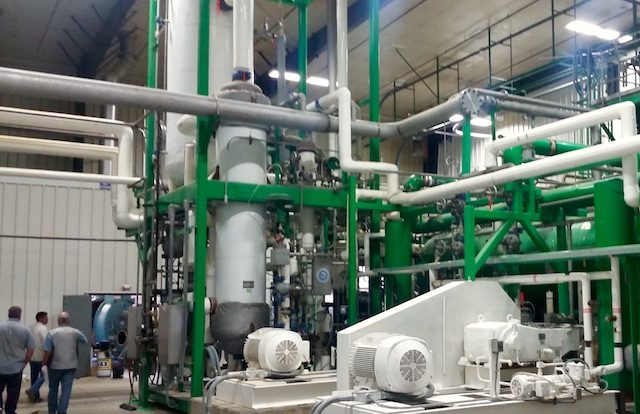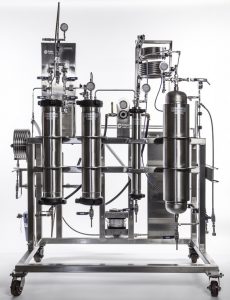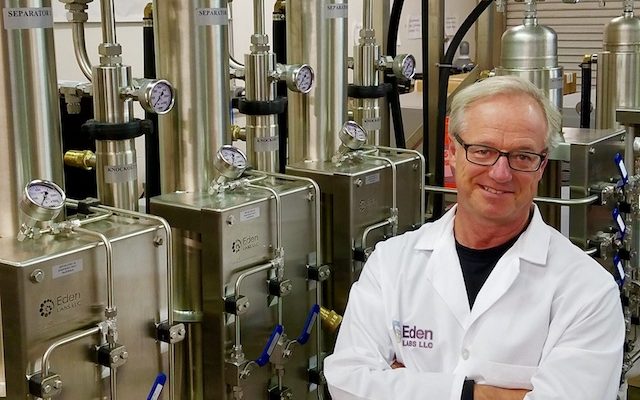A pioneer in the development of supercritical carbon dioxide extraction devices looks forward to the Golden Age of cannabis extraction.
It is safe to say the cannabis industry would look very different today had there never been an Eden Labs. The Seattle-based manufacturer of extraction equipment harkens back to 1996, when founder Fritz Chess, a former science writer living in Ohio, built Coldfinger™, a tabletop distillation device, reportedly the first piece of extraction equipment advertised in High Times. In the intervening years, the company, led by Chief Executive Officer AC Braddock, has remained a leader in the development and manufacturing of high-quality extraction machines—including the introduction of supercritical carbon dioxide extraction devices—in a market growing exponentially and becoming more competitive by the hour.
These days, the company still sells Coldfinger but has added a slew of CO2 extraction machines of various capacities. “We make custom compressed gas and ethanol systems based on a client’s design or a design we engineer based on product development and the system needed to create that product,” said Braddock. “We often have five-liter or twenty-liter supercritical fluid extraction (SCFE) systems ready go. The new FX2 20L design is the best seller now that people are understanding how fast it is, but the 2X 20L is beginning to eclipse it as our clients expand and the industry matures.”
While Eden Labs had no competition until the last few years, there are now over a dozen extraction companies to contend with, but Eden Labs has, over time, developed a reputation “for having exceptional customer service as well as the fastest, most reliable supercritical CO2 systems on the market,” said Braddock. “It’s a direct culmination of twenty-two years of innovation and our team, who are experienced, creative, and driven. Our goal is to build successful long-term relationships so we can scale our clients’ production needs and improve their bottom lines. We have proven this repeatedly by minimizing downtimes, improving yields, and reducing extraction times.”

Indeed, an ever-demanding industry seeking new markets for new products has magnified the demand for quality and durability Eden helped create in the early 1990s. “This is exciting and extremely fulfilling work,” said Braddock. “We have a dedicated [research and development] team who continue to develop systems that will be required in three to five years in extraction technology.”
Demand
Hash oil used to be a novelty item, but in 2009 Braddock realized the industry eventually would primarily be concentrates, and that concentrates would grow the industry by enabling it to legislate and legalize on medical applications. So, while Eden makes a variety of systems using multiple solvents, Braddock decided to market only CO2 and ethanol systems to the emerging cannabis industry.
“This gave the industry a clear, safe path and greater marketability,” she said. “Now we have twenty-nine legal states, all legal on a medical platform. It is very difficult to argue against a pure, safe extraction methodology that promotes health and wellbeing, and no one wants to provide a smoke-able medical solution to a child or the very ill. This will continue to be the case and could and should change our medical system by providing plant-based medicines that are affordable, pure, and through strain selection and separation are geared to specific receptors in our endocannabinoid systems. The concentrates market is just beginning, and the vast majority of the market will quickly become women and people over 50, instead of the traditional focus on males under 35.”
If there is a trend in extraction methodology, added Braddock, it is toward purity. “CO2 is the obvious answer, because the end-product is solvent-free and the process is safe and scalable to extract tonnage a day,” she explained. “However, ethanol is once again gaining ground and is excellent for topicals, edibles, and medicinal applications. Basically, any extraction or concentration methodology that is viewed as pure and solvent-free is gaining ground. On a cottage industry level, bubble hash, rosin, etc., are very popular, but are not scalable for commercial production. We are trying to drive connoisseur markets that reflect the wave in every market for organic, pure, sustainable products for human consumption.”

Quality
As demand for purity and quality increases, is the industry up to the producing the supply?
“Many brilliant extraction artists are maximizing current technology to produce new and/or higher quality products,” opined Braddock. She nonetheless cautioned, “There is a trend to bring PhDs and degreed chemists into the industry. What we like to see are companies that utilize the experience and knowledge of extraction artisans who have been doing this for years with a newbie to cannabis who brings a different skillset from a traditional chemistry background. The combination is extremely beneficial to the company and to the two extraction techs. Everyone wins.”
Misconceptions
When asked about the biggest misconceptions surrounding extraction, Braddock replied without hesitation, “Yields. This is always the first question with any industry: ‘What will the system yield?’ The system doesn’t exclusively determine the yield; the plant material, product desired, and the related extraction parameters are important in determining yield. For instance, [considerations include] the difference in extracting trim, trim and bud, bud and kief, etc., and how the plant material was cured and stored. Some clients grind up the entire plant; some only use high-quality trim and buds.
“The other component is the system,” she continued. “Is it optimized for a heavily resinous material? What is the solvent throughput, meaning how much solvent is pushed through the plant material? This last piece is the difference between an Eden system and other systems new to the market or systems that were designed for less-resinous material. The Eden systems have been developed for high throughput of resinous material.
“Basically,” she concluded, “their first question is, ‘What yield will the system produce?’ And our first question is, ‘What is the product you are trying to produce?’ From there, we can determine what the client needs and what outcome can be expected.”
“BASICALLY, ANY EXTRACTION OR CONCENTRATION METHODOLOGY THAT IS VIEWED AS PURE AND SOLVENT-FREE IS GAINING GROUND.” – AC Braddock
In fact, the need to educate potential customers has become a routine part of business. “Most prospective clients know little about extraction systems, and their financiers know less,” said Braddock. “This is fine. Why should they be experts? We offer the expertise.
“But some amount of research of company reputation, longevity, system configuration, and scalability is essential,” she added. “Understanding their own business model and extrapolating the bottom line of COGS is crucial. A system may cost $20,000 or more than another, but that could be made up in a matter of a day with the correct system. The main question that concerns us is simply knowing how much plant material they want to extract in a given time frame. Then, it comes down to choosing the right extractor. Of course, there are many other questions regarding facility requirements, budgeting long-term regarding financing issues for growth, regulatory issues, etc.”
Those decisions aside, Braddock said she has seen certain recurring traits among the company’s more successful clients. “They have well-thought-out three- to five-year business plans,” she said. “They already have some understanding of the industry and its challenges and are open to collaboration. They recognize our expertise is of great value to their success.”
The Golden Age
In terms of market expansion and product innovation, the best is yet to come for Eden Labs and the extraction community in general. “We have new products coming online this year, and we have expanded into other countries,” said Braddock. “The FX2 supercritical system is newly released, and our Coldfinger Distillers have also been reinvented. This is in time for the growing interest in ethanol distillation and environmental remediation. For instance, you can use our distiller as a bio-digestor to create methane gas, which is the primary component of natural gas, or you can extract with ethanol, take the waste material, ferment it, and create more ethanol…a complete, closed cycle. That is exciting and totally in line with our mission, and the industry’s social concerns, as well as [the concerns of] many other industries.

“Currently, the consumer market is still in the ‘bathtub gin’ phase of Prohibition,” she added. “High levels of THC are currently in demand, but this is not the market that is coming. As we understand more about the endocannabinoid system, the effects of terpenes, and individual cannabinoids, we will then begin to truly create products geared to every person on the planet, depending on their individual needs. This will also give the industry intellectual property opportunities in creating products for specific applications and tastes. As cannabis products become more normalized and people begin to see just how beneficial this plant is, we can then truly move to the Golden Age of extraction, where we create products for the health and well-being of consumers.
“We have an opportunity here to change human consumables in general,” she concluded. “We want to create corporate social responsibility companies that change other industries. We should be the example that drives what is important to the founders of this industry: social responsibility.”











